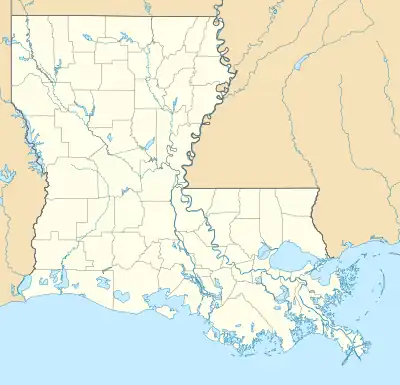Afton Villa Gardens | |
 Afton Villa, prior to its destruction by fire | |
 | |
| Nearest city | St. Francisville, Louisiana |
|---|---|
| Area | 140 acres (57 ha) |
| Built | 1849 |
| NRHP reference No. | 83000554[1] |
| Added to NRHP | February 24, 1983 |
Afton Villa Gardens is a historic formal garden on the grounds of a former slave plantation[2] in St. Francisville, Louisiana, U.S..
History
The land belonged to William Barrow when it was purchased by his brother, Bartholomew Barrow, in 1820.[3] The latter sold it to his son, David Barrow, in 1839.[3] When Senator Alexander Barrow died in 1846, he was buried on the grounds.[3] In 1849, David Barrow and his second wife, Susan A. Woolfolk, established a plantation and had a great house built.[3] It was designed in the Gothic Revival architectural style.[3] Meanwhile, they also designed formal gardens.[3]
The mansion burned down in 1963, but the gardens are still maintained.[3][4] They have been listed on the National Register of Historic Places since February 24, 1983.[5]
See also
- Residence Plantation House: owned by family member Roberta Barrow
- National Register of Historic Places listings in West Feliciana Parish, Louisiana
References
- ↑ "National Register Information System". National Register of Historic Places. National Park Service. July 9, 2010.
- ↑ "Afton Villa". aftonvilla.com. Retrieved January 25, 2022.
- 1 2 3 4 5 6 7 "Explore the History and Culture of Southeastern Louisiana: Afton Villa Gardens". National Park Service. Retrieved August 22, 2016.
- ↑ "Afton Villa Gardens". St. Francisville, West Feliciana Parish. Retrieved August 22, 2016.
- ↑ "Afton Villa Gardens". National Park Service. Retrieved August 22, 2016.